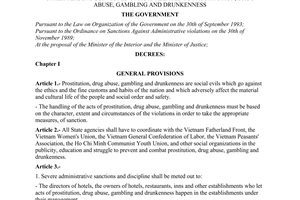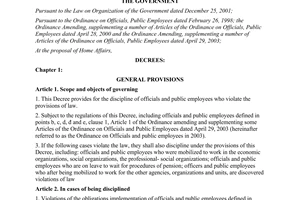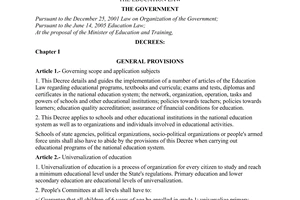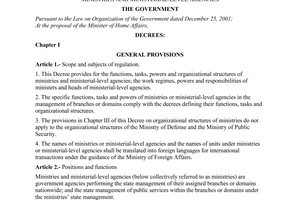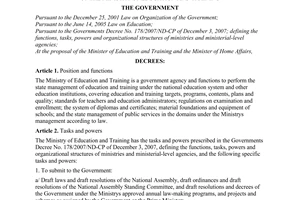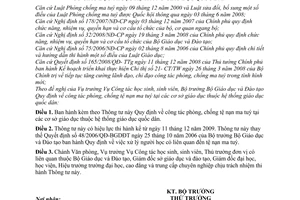Nội dung toàn văn Circular No. 31/2009/TT-BGDDT prevention and control of drug problems at educational establishments
|
THE MINISTRY
OF EDUCATION AND TRAINING |
THE
SOCIALIST REPUBLIC OF VIETNAM |
|
No. 31/2009/TT-BGDĐT |
Hanoi, October 23, 2009 |
CIRCULAR
ENFORCING THE REGULATION ON PREVENTION AND CONTROL OF DRUG PROBLEMS AT EDUCATIONAL ESTABLISHMENTS BELONGING TO THE NATIONAL EDUCATION SYSTEM
Pursuant to the Law on Drug Abuse Prevention and Control dated December 9, 2000 and the Law on Amendments to several articles of the Law on Drug Prevention and Control adopted by the National Assembly on June 3, 2008;
Pursuant to the Government's Decree No. 178/2007/NĐ-CP dated December 3, 2007 on defining the functions, tasks, powers and organizational structure of Ministries and ministerial-level agencies;
Pursuant to the Government's Decree No. 32/2008/NĐ-CP dated March 19, 2008 on defining the functions, tasks, powers and organizational structure of the Ministry of Education and Training;
Pursuant to the Government's Decree No. 75/2006/ND-CP dated August 02, 2006 on specifying and providing guidance on the implementation of several articles of the Law on Education;
Pursuant to the Prime Minister’s Decision No. 165/2008/QĐ-TTg dated December 11, 2008 on promulgating the plan on implementation of the Directive No. 21-CT/TW of the Politburo dated March 26, 2008 on continuing to promote the management and direction of drug prevention and control in the current situation;
After considering the request of the Director of the Student Administration, the Minister of Education and Training hereby introduces the Regulation on prevention and control of drug problems at educational establishments belonging to the national education system:
Article 1. The Regulation on prevention and control of drug problems at educational establishments belonging to the national education system shall be enclosed in this Circular.
Article 2. This Circular shall come into force from December 11, 2009 and replace the Decision No. 48/2006/QĐ-BGDĐT of the Minister of Education and Training dated October 25, 2006 on promulgating the Regulation on dealing with students engaged in drug problems.
Article 3. The Chief of the Office, the Director of the Student Administration, the Head of affiliates of the Ministry of Education and Training, the Director of the Department of Education and Training, the Director of universities and institutes and the President of universities, colleges and vocational schools, shall be responsible for implementing this Circular.
|
|
PP. THE
MINISTER |
REGULATION
PREVENTION AND CONTROL OF DRUG PROBLEMS AT EDUCATIONAL ESTABLISHMENTS BELONGING TO THE NATIONAL EDUCATION SYSTEM
Chapter I
GENERAL PROVISIONS
Article 1. Scope of application and applicable entities
1. This instrument shall provide for prevention and control of drug problems at educational establishments belonging to the national education system, including contents, measures to prevent and control drug problems; procedure for dealing with involvements of students, education administrators, teachers, educational administrative officers and staff (hereinafter referred to as teachers and educational staff) in drug problems; responsibility of the leaders of education administrations, educational establishments, and implementation.
2. This regulation shall apply to basic, continuing, tertiary education, professional training establishments or institutes (hereinafter referred to as educational establishments), relevant organizations or individuals.
Article 2. Interpretation of terms
Terms shown herein shall be construed as follows:
1. Drug refers to the addictive and psychotropic substances specified in the list promulgated by the Government.
2. Additive substance refers to the substance which has stimulatory and inhibitory effects on the nervous system as well as easily causes addiction for users.
3. Psychotropic substance refers to the stimulatory, inhibitory or hallucinatory substance which can easily cause addiction for users if they use it regularly.
4. Drug addict refers to the person who uses drugs, narcotics, additive or psychotropic substances and becomes dependent on these drugs or substances.
5. Drug problem refers to the drug addiction, and other drug-related crimes and illegal acts.
6. Drug prevention and control refers to the prevention and control of drug problems as well as management of other drug-related licit acts.
Article 3. Requirements of the prevention and control of drug problems
1. Become the routine task of all educational establishments.
2. Ensure the close cooperation of educational establishments with local communities and student’s families.
3. Promote the role and moral standard of educational staff and teachers, and enhance the proactive and enthusiastic behavior towards the prevention and control of drug problems at educational establishments and social communities.
Article 4. Principles of implementation
In the course of implementing drug problem prevention and control tasks at educational establishments, it is necessary to stick to the following principles:
1. Perceive the communication, propagation and initiative in preventing and convincing those who causes drug problems as radical solutions.
2. Impose objective, fair, severe and lawful punishments when dealing with students, educational staff or teachers engaged in drug problems.
3. Closely connect the educational content of prevention and control of drug problems with that of HIV/AIDS infection as well as other social problems.
Chapter II
CONTENTS AND MEASURES OF PREVENTION AND CONTROL OF DRUG PROBLEMS AT EDUCATIONAL ESTABLISHMENTS
Article 5. Education and propagation tasks
1. Contents:
a) Legislative documents on prevention and control of drug problems and handling of acts relating to drug problems and other relevant regulations.
b) Basic definitions of drugs, state of development, spreading and harmful effect of drug problems.
c) Measures which each individual, family and society should take to prevent the drug abuse, or measures to reduce the adverse effect of drug abuse and cure drug addicts by employing the replacement therapy.
d) Healthy lifestyle, problem-solving skills and resolute opposition to any participation in drug problems.
dd) Voluntary declaration of drug use and addiction, and typical persons who are honored for their attempt and determination to discontinue using drugs.
e) Awareness and responsibility of students, educational staff and teachers for detecting, combating drug problems as well as preventing drug problems from being penetrated into educational establishments, families and social communities.
2. Measures:
a) Education and propagation by means of curricular activities
- As for basic or continuing educational establishments, the content of education and propagation about prevention and control of drug problems shall be integrated into circular subjects in conformity with the statutory syllabus;
- As for tertiary and professional training establishments, the content of education and communication about prevention and control of drug problems shall be integrated into several subjects designed in the training program, and shall be disseminated by organizing events called "Talk-to-student weeks" held at the beginning or end of an academic term or at the start of an academic year under the instruction of the Ministry of Education and Training.
b) Education and propagation by means of extracurricular activities
- Organize extracurricular programs which will be attended by students from basic and continuing educational establishments;
- Organize art performance, movie-watching and opinion exchange activities; contests where contestants show their knowledge of prevention and control of drug problems by sending their writing papers or giving their on-stage performance, or submitting their photos, pictures, banners, logos, or composing their literary or dramatic texts;
- Hold direct talks and use visual aids, print or mass media to propagate the prevention and control of drug problems;
- Encourage students to join an educational establishment’s clubs for prevention and control of drug problems;
- Make best use of the activities of the Trade Union, Ho Chi Minh Communist Youth Union, Vietnam Student Association, Vietnam Youth Federation and Ho Chi Minh Young Pioneer Organization to educate and propagate the prevention and control of drug problems;
- Generate other education and propagation forms.
c) Integration of the prevention and control of drug problems into the mobilization and emulation of educational staff and local people.
Article 6. Administration duties
1. Draw up and implement the plan for prevention and control of drug problems in a specified academic year and period.
2. Promulgate specific regulations of educational establishments on prevention and control of drug problems which is required to conform to legal regulations. Include these specific regulations in the evaluation criteria for determining the result of emulation and compliance of student with standards of conducts and practices.
3. Check students’ health at the beginning of an academic year or on a periodic basis; perform random and spontaneous tests or inspections for drug use when there is any suspicion that students are using illegal drugs.
4. Encourage students to sign the commitment under which students are bound not to get involved in any drug problem and student's families are obliged to keep close watch of their family members in a specific academic year.
5. Receive and process relevant information about drug problem prevention and control tasks assigned to specific educational establishments from students, educational staff, teachers and the public.
6. Create records monitoring those connected with drug problems; assign organizations or individuals to keep track of and support students suspected to get involved in drug problems in order to collaborate in taking prompt measures against these problems.
7. Provide the healthy education environment and favorable conditions for students, educational staff and teachers to frequently participate in cultural and sports events with the aim of improving their spiritual welfare and keeping them away from drug problems.
8. Periodically examine, honor or grant awards to any collective or individual who obtains excellent achievements as well as imposes severe penalties on those committing violations against regulations on the prevention and control of drug problems.
Article 7. Collaboration
1. Each educational establishment must collaborate with local authorities, unions or associations, especially student’s families, in implementing the task of educating and managing students, and preventing and controlling drug problems.
2. The educational establishment shall cooperate with public security forces and local authorities to examine accommodations and dormitory rooms of students on a periodic or unscheduled basis; petition local authorities to examine and eliminate eating, drinking or gathering places where complicated drug-related and social problems are occurring in the vicinity of educational establishments, dormitories or student residential areas.
3. The educational establishment shall collaborate with healthcare facilities and local authorities in performing periodic or spontaneous tests if there is any suspicion that students, educational staff or teachers use illegal drugs.
Chapter III
PROCEDURE FOR DEALING WITH STUDENTS, EDUCATIONAL STAFF OR TEACHERS GETTING INVOLVED IN DRUG PROBLEMS
Article 8. Measures to deal with students engaged in drug problems
1. With regard to students violating regulations on manufacturing, trafficking, concealing, purchasing, buying, using, incriminating and coercing other persons to use drugs.
a) If they are completing their documents submitted to apply for an admission to an educational establishment, the offer of admission shall be cancelled, and their families or competent authorities shall also be informed to deal with them in accordance with laws.
b) If they are studying at an educational establishment, they shall be subjected to expulsion punishment, and their families or competent authorities shall also be informed to deal with them in accordance with laws.
2. With regard to students using drugs illegally
a) If they are applying for admission to an educational establishment:
- As for those making voluntary declaration about their drug use: If the competent authority has found any evidence that these students have not already become dependent on drugs, that educational establishment shall require them to undertake in writing that they will not repeat their violation, then admit them and concurrently collaborate with student's families in monitoring and supporting students to avoid the recurring illegal drug use; if students have already been found dependent on drugs, that educational establishment still admits them and then allow them to take a one-year (12-month) intermission and send them back to their family for any drug rehabilitation;
- As for those who do not make any voluntary declaration about their drug use, the educational establishment shall cancel the admission offer and notify their families as well as competent authorities to get them rehabilitated.
b) If they are studying at an educational establishment:
- As for those who make the voluntary declaration about their drug use: If the competent authority has any evidence that they have not been become dependent on drugs, the educational establishment shall warn and require them to undertake in writing that they will not repeat their violation, then admit them and concurrently collaborate with their families in monitoring and supporting them to avoid the recurring illegal drug use; if students have already been found dependent on drugs, the educational establishment shall allow them to take a one-year (12-month) intermission and send them back to their family for any drug rehabilitation;
- As for those who do not make any voluntary declaration about their drug use, the educational establishment shall impose a one-year (12-month) exclusion punishment and send them back to their families for any drug rehabilitation.
c) The educational establishment shall impose the exclusion punishment on those who repeat their illegal drug use.
Article 9. Procedures for imposition of disciplinary penalties on students connected with drug problems
Procedures for imposition of disciplinary penalties on students connected with drug problems shall conform to provisions laid down in the Regulation on students of universities, colleges and professional training establishments, and regulation on imposing disciplinary penalties for violations committed by students of basic and continuing educational establishments.
Article 10. Procedures for considering permission to resume study
1. Within 30 days prior to the end of the valid term of the study suspension or intermission permission, students must submit the following documents to educational establishments:
a) Application form for study resumption.
b) The document confirming that they are not dependent on drugs issued by competent authorities.
c) The written commitment of students and student families on not repeating the illegal drug use.
2. The educational establishment shall refer to documents stipulated in Clause 1 of this Article to consider and decide to void the punishment (if any), and permit students to resume their studying as well as collaborate with student families in monitoring and supporting students to avoid any recurring illegal drug use. If the valid term of the study suspension or intermission ends and students fail to submit required documents stipulated in Clause 1 of this Article, they shall be removed from the student list of the educational establishment.
Article 11. Method and procedure for dealing with drug-related educational staff and teachers
1. If such educational staff or teachers belong to the government payroll system, they shall be subjected to disciplinary penalties under the provisions of the Government’s Decree No. 53/CP dated June 28, 1994 on stipulating measures to impose punishments on governmental officials or staff or those getting involved in prostitution, drug, gambling or excessive alcohol addiction; the Government’s Decree No. 35/2005/NĐ-CP dated March 17, 2005 on measures to be taken to impose disciplinary penalties for violations committed by government officials or staff; the Circular No. 03/2006/TT-BNV of the Ministry of Home Affairs dated February 8, 2006 on providing guidance on implementation of several articles of the Government’s Decree No. 35/2005/NĐ-CP on imposing penalties for violations committed by government officials or staff as well as other relevant regulations. When the abovementioned documents are replaced by any other legislative document, these replacement documents shall govern the imposition of these disciplinary penalties.
2. If such educational staff and teachers are working under an employment contract, disciplinary penalties shall be governed by the Labor Code and other guiding documents.
3. In case teachers are subjected to punishments ranging from a warning to more severe penalties (except for dismissal), the educational establishment shall transfer them to another post and does not allow them to participate in any teaching activities during the period of disciplinary penalties.
Chapter IV
RESPONSIBILITY OF THE HEAD OF EDUCATION ADMINISTRATIONS AND EDUCATION ESTABLISHMENTS
Article 12. Responsibility of the Director of the Department of Education and Training, the Head of the Division of Education and Training
1. Advise the People’s Committee on setting up policies on collaboration on prevention and control of drug problems that occur at educational establishments in their areas.
2. Direct, expedite and inspect educational establishments in organizing drug problem prevention and control activities and imposing penalties on students, educational staff and teachers getting involved in such drug problems under the provisions of this Regulation.
3. Compile a statistical data about involvements of students, educational staff and teachers in drug problems and make regulated reports.
Article 13. Responsibility of the Headmaster (Director) of the educational establishment
1. Adopt the specific plan on implementation of all contents enshrined in this Regulation for each academic year and period.
2. Proactively collaborate with student families and relevant regulatory agencies in dealing with students, educational staff and teachers getting involved in drug problems. Admit post-detoxification students to their educational establishments in a timely manner as prescribed by laws.
3. Periodically hold the preliminary or final meeting about implementation of this Regulation amongst all staff members of their educational establishments. Take measures to regularly examine and supervise their affiliates and all of their students, educational staff and teachers in terms of implementation of drug problem prevention and control duties.
Chapter V
IMPLEMENTATION
Article 14. Reporting policy
1. Educational establishments shall take on responsibility to make a statistical report on prevention and control of drug problems upon the request of competent authorities.
2. Those who fall outside of the jurisdiction of the department of education and training and the department itself must report drug problem prevention and control activities to the Ministry of Education and Training on a periodic basis at the end of an academic term or year, and carry out spontaneous reporting when there is any complicated and serious case that may take place.
Article 15. Appreciation and award policy
1. Organizations or individuals who gain remarkable achievements in detecting, reporting and dealing with those engaged in drug problems shall be entitled to appreciation and awards as stipulated by laws.
2. The good practice of prevention and control of drug problems occurring in an education environment shall become one of the significant criteria for the education administration’s assessing and granting recognition and awards to all of staff members of such educational establishment in each academic year or period.
Article 16. Handling of violations
Organizations or individuals that do not implement or incorrectly implement this regulation on prevention and control of drug problems, depending on the severity of such violations, shall be subjected to disciplinary, administrative penalties or face with the criminal prosecution in accordance with laws.
------------------------------------------------------------------------------------------------------
This translation is made by LawSoft and
for reference purposes only. Its copyright is owned by LawSoft
and protected under Clause 2, Article 14 of the Law on Intellectual Property.Your comments are always welcomed

